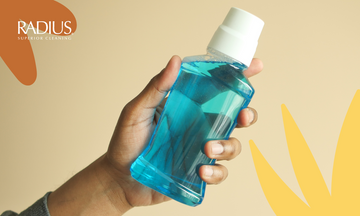Mouthwash is an integral part of a comprehensive oral hygiene routine, offering benefits that go beyond just freshening breath. With a variety of options available, understanding the different types of mouthwash and their specific benefits is key to optimizing your dental health. In this article, we'll explore the diverse world of mouthwashes and how they can complement your daily oral care regimen.
Types of Mouthwash:
Cosmetic Mouthwash: Primarily used for temporary relief of bad breath and a pleasant taste. While they do not address underlying oral health issues, they are useful for a quick refresh.
Therapeutic Mouthwash: Contains active ingredients targeting oral health concerns like plaque, gingivitis, and tooth decay. These are often recommended by dental professionals for specific dental needs.
Natural Mouthwash: Focuses on using natural ingredients, avoiding chemicals like alcohol, chlorhexidine, or fluoride, appealing to those who prefer a more organic approach to oral care.
Benefits of Using Mouthwash:
Reduces Plaque and Gingivitis: Therapeutic mouthwashes can help prevent plaque buildup and reduce the risk of gingivitis.
Freshens Breath: Even cosmetic mouthwashes can temporarily improve breath, boosting your confidence.
Helps in Cavity Prevention: Fluoride-containing mouthwashes can assist in reducing the occurrence of cavities.
Choosing the Right Mouthwash:
The choice of mouthwash depends on your specific oral health needs and personal preferences. For those seeking natural options, brands like Radius offer products that align with a holistic, eco-friendly approach to oral care. When selecting a mouthwash, consider factors like the presence of fluoride, alcohol content (especially if you have a dry mouth), and whether it addresses specific concerns such as sensitivity or gingivitis.
Using Mouthwash Effectively:
Read Instructions: Usage can vary between different mouthwashes, so it's important to follow the product's specific instructions.
Avoid Dilution: Use the mouthwash at its full strength unless directed otherwise.
Timing: For maximum benefit, use mouthwash at a different time from brushing, as some toothpaste ingredients can interact with mouthwash components.
Regular Use: Incorporate mouthwash into your daily routine for sustained benefits.
Conclusion:
Incorporating the right mouthwash into your oral care routine can significantly enhance your overall dental health. Whether you opt for a therapeutic, cosmetic, or natural mouthwash, ensure it meets your specific oral health requirements. Remember, while mouthwash is a valuable addition to oral hygiene, it should be used in conjunction with regular brushing and flossing for the best results.

